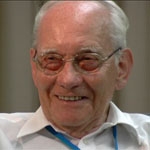Nobel Prize in Chemistry in 1967 for extremely fast chemical reactions, effected by disturbing the equilibrium means of very short pulses of energy.
-
Videos
- Video Interviews with Scientists
- Nobel Prize Video Interviews
- Issues of Concern
- Science Video Lectures
- Reflections on Science Videos
- Masterclass Science Videos
- Science Career Videos
- Lindau 2003 Documentary
- The Next Big Thing Science Videos
- Science Video Research Projects
- Educational Resources
- Documentaries
- Art & Science Videos
- STFC Video Portal
- Women in Science
- You are here >
- Home
- Programmes
- Nobel Prize Video Interviews
- Manfred Eigen - Science Video Interview
Video recorded in 2005 and interviewed by Harry Kroto.
Manfred Eigen was awarded the Nobel Prize in Chemistry in 1967 for
extremely fast chemical reactions, effected by disturbing the equlibrium
means of very short pulses of energy. This award of half of the Nobel
Prize was shared with George Porter and Ronald George Wreyford Norris.
The interview starts with Eigen talking about his early work for his PhD
thesis on fast reactions and measuring the specific heat of heavy water.
He says that light water had already been measured in classical
chemistry but not heavy water which was very expensive at that time
(1947-48). Eigen`s first experiment ended in an explosion to the dismay
of his supervisor but luckily he had conducted the first experiment
without using heavy water.
Eigen goes on to tells us about a project working with the British Navy
and the Scripps Institute looking at sound absorption in sea water. Sea
water absorbs sound very well and could be used to detect underground
submarines. Eigen`s mission was to find out why this was so.
In 1953 Eigen moved to the Max Planck Institutue to measure fast
reactions. In 1916 Einstein had worked out a theory which Eigen then
applied and worked out how to measure. In 1953 he went to a Faraday
meeting on fast reactions where Eigen who was on his first visit to the
UK asked how should he call his reactions ( which go to ten to the minus
nine)? He was told to call them `damned fast reactions` and if that
were not enough to describe them, `call them damned fast reactions
indeed!`
Manfred Eigen continues, discussing his research in detail; the founding
of a nanotechnology company based in Hamburg and Oxford making
industrial enzymes and last but not least he discusses Darwin and
population genetics. He says that his major concern on science and
society issues is over population and population growth.
Links To Other Information:








